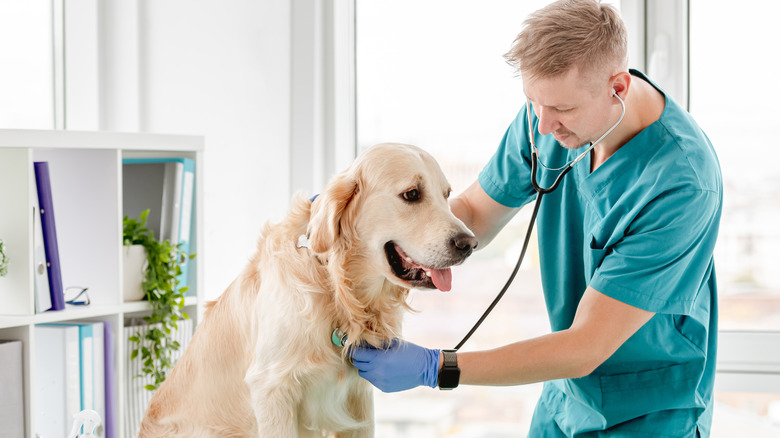Signs Your Pet Needs A Visit To The Vet
There's nothing better than coming home from a long day to find a wagging tail or a purring ball of fur happily waiting for you. Almost immediately, you switch from being a dependable coworker or friend to being the single most significant role you could play at that moment — a pet parent. No text, dinner, or emergency is as important as walking your dog.
Pets can improve their owners' health, and they provide important companionship. With the amount of time we spend with our pets, we even begin to understand nonverbal and verbal cues from them. We know when they're hungry, want cuddles, or want to sleep with us — even though letting your pet on the bed may not be the best idea. They understand us, too, and willingly choose to ignore us when we ask them to stop chewing our shoes. So, most pet owners are also attuned to when their pets aren't acting like themselves or aren't feeling well.
As a rule, you should take your pets to the veterinarian for annual physicals, and maybe twice a year when they're senior animals, according to Susan Barrett from the Ohio State University College of Veterinary Medicine (via Web MD). However, there are other signs and symptoms in your pet that would warrant an immediate visit.
Observe any changes in behavior
One of the easiest ways to know that your pet isn't feeling well is to observe their eating habits and poop. "Change in the color, consistency, odor, or regularity of bowel movements can all be indicative of anything from inappropriate food, allergies, viruses, bacteria, intestinal parasites, or organ problems," Jessica Trimble from Fuzzy Pet Health, told Insider. If they're experiencing diarrhea, constipation, or have blood in their stool, they need to be taken to the vet. Additionally, if they're vomiting along with a range of symptoms like excessive water drinking and lethargy, it may point to a possible virus in their stomachs.
For cats, prolonged panting or "open-mouthed breathing ... is almost always a sign of respiratory distress from a condition like asthma or heart disease," veterinarian Dr. Oscar E. Chavez told Insider. In general, pay attention to any changes in breathing or activity as they may be signaling something that needs to be checked out. Other physical changes to note are dilated pupils, droopy eyes, bumps or balding patches, all of which require a formal diagnosis.
But if your pet is bleeding, has open wounds, suddenly collapses, has a seizure, excessively vomits and/or can't seem to vomit despite trying, struggles to breath, eats toxins, is in distress during labor, or is disoriented, take them to the vet immediately as these are emergency symptoms (via American Kennel Club).

